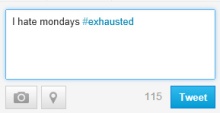I think it is safe to say that celebrity culture monopolises the media on a day to day basis and I must admit my day isn’t complete without my celebrity gossip fix. However, it is worrying to consider the factors which now constitute a newsworthy piece. On some level it is no longer political war and fury, no, believe it or not conflict such as the likes of Katie Price and Kelly Brook hanging out one another’s dirty laundry that dominates the minds of many. Now I don’t dispute that on your lunch break at work you’d rather be nattering about Pricey’s scathing ‘fat’ remarks rather than analysing the extent of conflict in Syria, heck I can’t think of anything worse.
However there is a need to consider the effects of broadcasting such behaviour. We live in a society, heavily social media reliant, rolling out of bed checking your Twitter, probably communicating virtually before you’ve even uttered hello in the real word.
Social media is creating a foundation for young children to adopt any character they want, freedom of speech and the security of a computer screen can lead to only one thing, cyber bullying. One website claims;
“350 million users suffer from Facebook addiction syndrome”
Facebook addiction syndrome?! What a sorry state of affairs.
Cyber Bullying is defined as;
“when a person or a group of people uses the internet, mobile phones, online games or any other kind of digital technology to threaten, tease, upset or humiliate someone else”
With reference to this definition, does Katie Price Vs Kelly Brook’s very public spat not constitute cyber bullying? How can we ever expect to educate our children right from wrong when celebrity icons are party to such behaviour. Throwing the word ‘heffer’ around to 1.7 million followers is simply shameful behaviour. The inevitable conflict lies in an endless battle to educate children against bullying when your faced with role models on the very same social networks undoing all the hard work. Celebrities should be ashamed of themselves realistically encouraging online feuds.
(Youtube Video- Kelly Brook fights back)
Conflict theory states that;
“values and ideas are seen as weapons used by different groups to advance their own ends rather than as means of defining a whole society’s identity and goals” (Wallace, 1995, 77)
Adopting Wallace’s theory, Pricey isn’t intentionally becoming an advocate of cyber bullying, her viscious remarks were simply a desperately stupid attempt at making herself feel better. However, it is important for these ‘role models’ to recognise the potential outcomes. Conflict needs to be mediated in such a way to ensure that it is both ethical and just. For example Back & Back (1991:1) recognise this as;
‘Expressing your needs, wants, opinions, feelings and beliefs in direct, honest and appropriate ways’.
I’m sure even Katie Price, who has never been known for her appropriateness, can manage to communicate herself in a civil and polite manner… if she tried really hard. Its high time celebrities in the media considered the consequences, issues such as Cyber Bullying need a united front in order to tackle the ever growing social media prominence.
So come on, Katie/Kelly, do us a favour and do it behind closed doors, if not for everyone else’s sake, think of your own children. We dont want Princess jumping on the bandwagon.










